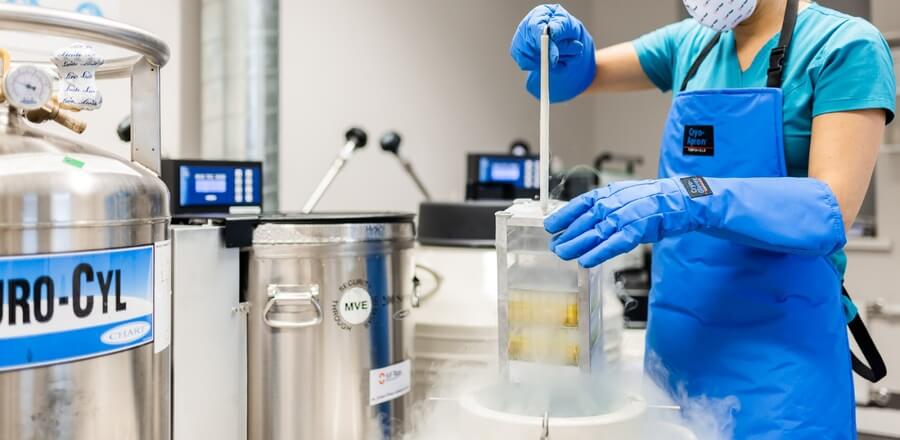About Treatment
What is Embryo Freezing?
Cryopreservation is a method of freezing and long-term preservation of biological material at a very low temperature. Under such conditions, biological processes in living cells stop until thawing.
Cryopreservation technologies for biological material are an integral part of modern reproductive medicine and are widely used in the treatment of infertility.
How is cryopreservation and storage of frozen embryos, eggs, spermatozoa carried out?
Cryopreservation (freezing) of biological material implies its long-term storage at a low temperature. Before embryos, eggs or sperm are placed in the cryostorage, they are treated with special substances - cryoprotectants. Cryoprotectants protect living objects from the negative effects of low temperatures during freezing and storage.
Frozen embryos, eggs and sperm are kept at a temperature of -196 ° C in individual containers placed in special labeled containers with liquid nitrogen. In a deep-frozen state, germ cells and embryos can be stored for many years. Moreover, all their biological functions are preserved.
Modern cryopreservation technologies are not only successfully used in the treatment of infertile patients, but also provide a unique opportunity for family planning for healthy people.
-
How long can frozen embryos be stored?
Frozen embryos can be stored as long as necessary - from several months to several decades.
-
Can all embryos obtained in the IVF cycle be frozen?
Not all embryos obtained in the IVF cycle are subject to freezing, but only embryos of good quality.
In most cases, a large number of eggs mature during an in vitro fertilization program. After fertilization, as a rule, a lot of embryos are obtained, however, no more than 1 - 2 are transferred into the uterine cavity. If, in the current IVF protocol, it is possible to obtain more embryos than are necessary for transfer in a given cycle, or their transfer for medical reasons is not possible, then such embryos can be frozen. In the future, they can be used for a repeated attempt in the event that pregnancy does not occur in the current cycle, or for the birth of a second and subsequent children.
Increasing the likelihood of pregnancy due to repeated transfers of embryos into the uterine cavity: freezing of embryos is a kind of "insurance" for patients in case pregnancy does not occur in the current cycle;
Decrease in the drug load on the woman's body before replanting thawed embryos, due to the absence of the need for hormonal stimulation and follicular puncture;
Significant reduction in the financial costs of patients: the cost of freezing, storing and transferring thawed embryos into the uterine cavity is much lower than the cost of a repeated stimulated IVF cycle;
Possibility of conceiving a second and subsequent children;
Preventing the death of viable embryos;
Possibility of donor transfer of embryos to infertile couples.
Cryopreservation of embryos is performed in the following cases:
obtaining more than required for transfer into the uterine cavity, the number of good quality embryos (for their use in subsequent IVF attempts);
high risk of developing ovarian hyperstimulation syndrome;
decrease in the likelihood of embryo implantation into the uterus (for example, when an endometrial polyp is detected, with insufficient thickness of the endometrium, with dysfunctional uterine bleeding);
deterioration of a woman's well-being (due to an exacerbation of a bacterial or viral infection, ovarian hyperstimulation syndrome, the need to perform an emergency operation, etc.);
cicatricial deformity of the cervix, anatomical narrowing of the cervical canal (stenosis), the consequences of surgical interventions that prevent embryo transfer in the current IVF cycle;
participation in the surrogacy program;
undergoing the procedure of preimplantation genetic diagnosis of embryos;
repeated unsuccessful IVF attempts;
planned chemotherapy or radiotherapy for cancer.
Depending on the characteristics of the patient's reproductive system (endometrial condition, hormonal levels, etc.), replanting of thawed embryos can be carried out in a natural cycle, or in a cycle using hormone replacement therapy. Preparation for embryo transfer after cryopreservation is performed under the supervision of a physician.
Cryopreservation of embryos does not affect either their quality or fetal development during pregnancy. Babies born as a result of pregnancy using thawed embryos are no different from other babies.
Cryopreservation of embryos is a reliable and highly effective technique successfully used in our department. The use of only the most effective and safe achievements of the world practice of infertility treatment, as well as high professionalism and many years of successful experience of our specialists determine the highest quality of all the procedures we perform and help us to make our patients' dream of having a healthy child come true.











